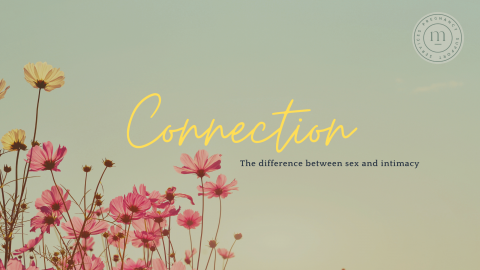
Many of us grew up without solid, strong, loving connections to others. Either these connections were weak, fearful, or both. Without these strong, loving connections as our support and example, we don’t learn how to relate to others, or even ourselves, well. We struggle with knowing what we feel and what we need. We need the trust and joy which comes from knowing someone is truly glad to be with us - no matter what we’re going through or feeling; but instead, we can be dominated by a fear of abandonment and rejection.
We need connection but don’t know how to get it. For many, loneliness and pain push us to pursue things that help alleviate these feelings, whether that’s food, alcohol, drugs, etc. And they can become addictive because it makes us feel good, at least temporarily. For many people though, the need for connection leads to sex.
However, our desire for connection with other humans goes deeper than just a physical sexual connection. It can be common to think our connection problem is really a sex problem. That is why sex is often seen by couples facing relational issues as the major source of their pain; however, harmonious couples view sex as only one aspect of what contributes to their happiness.
See, the problem is that sex doesn't heal the pain underneath and it is different from connection. Rather, sex needs that connection as its foundation if it is going to foster true intimacy.
And without connection? Sex without that foundation often leads to isolation, loneliness, and sorrow. Sex can become ‘the ends’ rather than ‘the means. Interactions often resemble these three patterns:
Control
Sex is about expressing and living out our desires. It is the tool we use to meet our own sex needs. Our partner becomes someone we work to possess. We overcome our fears of rejection because we feel the satisfaction of being capable, confident, and in charge. Instead of gaining connection, we gain a sense of power and control. Ultimately, this lack of connection only leads to objectification, indifference, and egotism.
Compliance
Sex is about compensating for the connection we desperately want and are lacking. It is a performance that we use to alleviate our anxieties. Our partner becomes someone whose attentions we work to keep. We reduce our fears of rejection by pleasing the needs of our partner, even if that means denying our own needs. Instead of connection, we gain a sense of relief and security. Ultimately, this disingenuous connection only leads to vulnerability, coercion, and emotional alienation.
Avoidance
Sex is about immersion in our own imaginations and desires. It is a vehicle we carefully drive in order to achieve pleasure, while avoiding real commitment or responsibility. Our partner becomes someone who we will substitute for that “ideal partner.” We prevent our fears of rejection by remaining emotionally self-sufficient and distant from our ‘real’ partner. Instead of gaining true connection, we gain a sense of independence and pretend intimacy. Ultimately, this artificial connection only leads to dissatisfaction, emptiness, and potentially many break-ups.
The common thread in these interactions is there is no “us.” The focus is “my” needs and experience, and “they” become the means to meeting my goals. Without a foundation of connection, sex cannot contribute to its real purpose, intimacy.
Intimacy
When trust, communication, and commitment are established sex is an “us.” Our overall relationship is characterized by mutual care and recognition of each other’s needs and having joy meeting them; showing gentleness towards their weaknesses and responding with encouragement. With such strong, loving connections, we do not need to worry that our partner’s needs or feelings are about controlling or manipulating us or that they could abandon us if we don’t meet their needs. We can risk being close without needing to control. We can rest knowing that hurt can be followed by closeness and comfort. We can wholeheartedly and openly embrace life because that connection won’t be pulled out from under us or lost.
This is what we long for.
See, sex doesn’t so much ‘build’ intimacy as much as ‘seal’ it. Connection must come first - to build intimacy.
If you find you’ve been chasing sex rather than building connection - the opportunity is before you. Invest in the process that will produce enduring satisfaction and security. It’s not a quick fix but sealing something that is not built to last will only mean it has to get torn up again. That hurts. The longer road is worth it, and it is beautiful.
Navigating relationships can be complex and difficult. You don’t have to do it alone; we would be glad to be a support and offer encouragement. We have a special program called “Connected” to help you build healthy relationships. If you would like more information or to book an appointment, click here.
By: Kirsten, BA, Executive Assistant
References:
Carroll, A. (2021, August 31). Sex and intimacy: Are they different? Psych Central. https://psychcentral.com/blog/how-does-sex-differ-from-intimacy#takeaway
Weiss, R. (2022, September 28). Intimacy vs. sex. Psychology Today. https://www.psychologytoday.com/us/blog/love-and-sex-in-the-digital-age/...
Wilder, E. J. (2004). The complete guide to living with men: Keep growing and stay lovable. Shepherd's House Inc.
Zhang, W. (2022). The role of sex in intimate relationships: An exploration based on Martin Buber’s intersubjective theory. Frontiers in Psychology, 13. https://doi.org/10.3389/fpsyg.2022.850278
